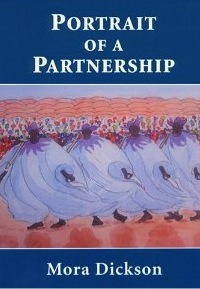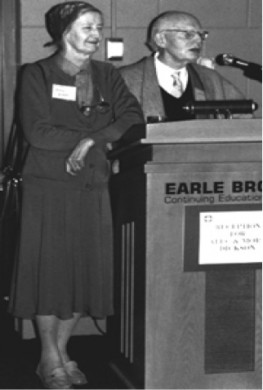Many people have encouraged others to use their strengths. These people have come from many different fields. They have been educators, leaders, managers, coaches, therapists, carers, social activists and others.
Alec and Mora Dickson were two such people. Alec was acknowledged for his work in creating Voluntary Service Overseas and Community Service Volunteers. Anybody who met them, however, realised that Alec and Mora combined their talents to form a remarkable team.
The Emphasis
on Strengths
Maybe I should declare an interest here. It was Alec who gave me my first opportunity to work with people. Travelling to CSV’s office in London in 1967, I had no idea how my life would change.
Certainly I travelled in hope. Several years had been spent trying to get a full-time voluntary job helping others, but this had proved difficult. During the visit to Toynbee Hall, I had a promising meeting with Elisabeth Hoodless, who was later to lead CSV. Alec then introduced himself to me.
The things he said struck an immediate chord. He believed that every person had strengths. My lack of education did not matter, he said. I had something to give. Treating me as if I was extremely intelligent, he explained the philosophy behind VSO and CSV.
“We need to tap into people’s desire to build a better world. I believe that young people have enormous idealism and, at the same time, there are many unmet needs in society. So why not match these two together? We can use the young people’s energy to meet those needs and build a better world.”
Alec believed that the giver often receives as much as the receiver. Why? Our self fades into the background when we are giving, yet we often feel more real afterwards. Leaving the meeting, I floated along the pavement.
Elisabeth and Alec had promised me they would find a place for me to serve. They gave me the opportunity to become a housefather for mentally handicapped children. Since that day I have always had the opportunity to do fulfilling work.
A Meeting
Multiplied Many Times
Many people reported similar meetings that changed their lives. Here is an extract from an obituary written about Alec after his death in 1994. It was written by Martin Stephen for The Independent.
“I met Dickson on a variety of occasions but the abiding memory is of the first: being summoned by him to a meeting at 11.30pm at Sheffield Midland station (he was, as usual, in transit), to discuss my recently announced placing as a volunteer at a northern remand home.
“I was barely 17 years old. Though there were clear similarities between my recent experience in a public school boarding-house and life with 50 delinquents in a secure unit, my sense of panic was held at bay only by my sense of shock.
“I do not remember his exact words, but he said he trusted me, as he trusted all his volunteers, to do the job, to help someone along the way and to end up just a little wiser after.
“It was a turning point in my life and I know from countless conversations that I was one of many who were similarly affected.”
Background
Alec was born in 1914 and educated at Rugby and New College, Oxford. Beginning work as a journalist, he also spent enormous amounts of times doing voluntary work with offenders and deprived children.
After the Second World War he began working with organisations in Africa, The Middle East and South East Asia. Martin Stephens continues the story.
“It was while working for the British Council of Churches at the time of the Hungarian uprising of 1956 that Dickson had the idea for Voluntary Service Overseas.
“He saw the impact of Western students in refugee relief and how much valuable work could be done by the young. To be 18 and untrained was, as far as Dickson concerned, a positive advantage.
“A letter from the Bishop of Portsmouth – in fact written by Dickson – to the Sunday Times calling for school leaver volunteers to work overseas led to the first 12 recruits leaving for Sarawak, Ghana and Cameroon. Working from their kitchen table, Dickson and his wife Mora founded Voluntary Service Overseas.”
Alec and VSO eventually went separate ways, but not before it provided the inspiration for The Peace Corp in the USA. Martin Stephens continues the story.
“He turned to another challenge, Community Service Volunteers, an organisation for young volunteers in Britain. Again working from the kitchen table, and with nothing to guide him except the support of Mora and a conviction that it could be done, he sent the first volunteer from London to a Glasgow approved school in 1962.”
Mora survived Alec and lived until 2002. She produced a lovely book about their work together, called Portrait of a Partnership.

David Green wrote the following in The Guardian after her death.
“Theirs was a remarkable partnership, with Mora providing wisdom and judgment, together with strong organisational skills to complement Alec’s vision, oratory and occasional lack of realism.
“Together, they took the concept of volunteering to new heights, and much of the current thinking in citizenship and social responsibility, both in Britain and internationally, stems from their work.”
Alec and Mora helped thousands of people to believe they had strengths and something to give. Let’s leave the final words with Mora, who wrote this after Alec’s death.
“Alec’s message was a simple one, and it never changed. What made it impressive was that he lived it out. Love and help those less fortunate – and have confidence in their ability to do the same.
“He believed especially in the young. His vision made it possible for very many of them to accept challenges and tackle tasks that seemed at first impossible.”
Links
* Alec and Mora Dickson Obituaries.
Here are some links to obituaries about Alec and Mora.
Alec.
http://www.independent.co.uk/news/people/obituary-alec-dickson-1442037.html
Mora.
http://www.guardian.co.uk/news/2002/jan/01/guardianobituaries1








Leave a Reply